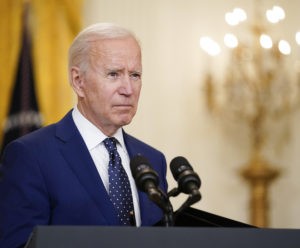Immigration advocates — including numerous faith-based groups — reacted harshly to the Biden administration’s April 16 announcement that it would not, after all, raise the ceiling for admission of refugees this year.
The blowback was so swift and harsh that within less than 24 hours the White House had walked back its Friday news — although with an unspecific plan to revisit the issue in May, leaving immigration advocates still fuming.
“This is incredibly disappointing. The United States is the most powerful nation in the world, and we can’t do better?” said Ali Noorani, president of the National Immigration Forum.
“The United States is the most powerful nation in the world, and we can’t do better?”
A promise broken
On Nov. 12, 2020, as president-elect, Joe Biden made this bold declaration in a recorded message to a Catholic group that works with refugees: “The United States has long stood as a beacon of hope for the downtrodden and the oppressed, a leader of resettling refugees in our humanitarian response. I promise, as president, I will reclaim that proud legacy for our country. The Biden-Harris administration will restore America’s historic role in protecting the vulnerable and defending the rights of refugees everywhere and raising our annual refugee admission target to 125,000.”
In February, Biden signaled he intended to raise the cap to 62,500 this year as a first step toward the higher goal of 125,000.
That would have quickly increased the refugee pipeline into America from the historically low level of 15,000 set by Trump for this year — after four years of declining admissions — yet still short of the historic high levels for admissions and for the pent-up demand created by the Trump blockade.
As president-elect, Biden’s own website declared that Trump’s 15,000-person limit for this year is offensive. “Trump has waged an unrelenting assault on our values and our history as a nation of immigrants,” the site said.

On April 15, 2021, President Joe Biden speaks about Russia in the East Room of the White House in Washington. In recent days, Biden has piled new sanctions on Russia, announced he would withdraw all U.S. troops from Afghanistan in less than five months and backed away from a campaign promise to sharply raise refugee admission caps. (AP Photo/Andrew Harnik, File)
Thus, those who celebrated the change of administrations as a sign of better days ahead for normalized immigration were shocked when on April 16 Biden signed an emergency determination that said the refugee ceiling set by Trump for this year “remains justified by humanitarian concerns and is otherwise in the national interest.”
“Today’s announcement is a clear political move to mitigate critique around asylum-seekers at the southern border,” said Ryan Eller, founder of the New Moral Majority and executive director of Define America, based in Louisville, Ky.
“The result won’t be any improvement in policy discourse, just an unnecessary diminishing of public trust and, worse, families who were vetted and ready to come to the U.S. that will continue to suffer (and communities that were ready to welcome them who now must re-group),” he added.
Ironically, just the day before the Biden announcement on maintaining this year’s ceiling, a group of evangelical leaders had urged the president to raise the ceiling, questioning why it had taken so long already for him to fulfill his promise.
Among those was Russell Moore, president of the Ethics and Religious Liberty Commission of the Southern Baptist Convention, who said: “Rhetoric is no refuge for the persecuted — we need action.”
The evangelical leaders noted that already more than 700 people approved for resettlement have had their travel plans canceled because of the administration’s delays. “Some will not be allowed to travel immediately even once the ceiling is signed, because required health and security screenings will have expired and need to be restarted, further delaying reunification with family in the U.S. in many cases.”
What happened?
On one hand, Biden and other White House officials signaled that the surge of unaccompanied minors coming across the southern border from Central America via Mexico had stopped progress on revamping legal immigration of vetted refugees.
On Saturday, April 17, Biden told reporters: “The problem was that the refugee part was working on the crisis that ended up on the border with young people. We couldn’t do two things at once. But now we are going to increase the number.”
That answer further infuriated immigration advocates.

Ali Noorani
“Refugee resettlement has nothing to do with what is happening at the border. There exists a national network of organizations, churches, state offices who have decades of experience resettling refugees,” said Noorani of the National Immigration Forum.
Trump loyalists, including Stephen Miller, architect of Trump’s harsh policies, pounced on the news as a sign that the new administration fears a voter backlash — which is not likely since polling consistently shows that a majority of Americans favor immigration and refugee resettlement.
A more realistic assessment is that the Biden administration has discovered how broken the immigration pipeline is and fears overwhelming it with a sudden rush will lead to more chaos and criticism.
Laura Barrón-López, White House correspondent for Politico, tweeted April 16 that a senior White House official had told her the nation’s refugee admissions program they inherited from the Trump administration “was more decimated than they’d thought” and “requires major overhaul to build toward the numbers” to which the Biden administration previously committed.
The nation’s refugee admissions program they inherited from the Trump administration “was more decimated than they’d thought.”
Faith leaders working most closely with immigration issues had warned earlier that it would take months if not years to rebuild the damage done worldwide by Trump’s “America First” policy that drove legal immigration numbers to the lowest numbers in decades. That is due to the intentional dismantling of the infrastructure needed to process asylum seekers and other immigration applicants around the world.
That, in turn, led the nongovernmental aid organizations that provide critical links of service in the refugee pipeline to lay off huge numbers of staff members and close entire offices.
The result was that not only did the Trump administration close the door to asylum seekers, it tore down the bridge that leads to the door.

Ali Al Sudani
In November 2020, Ali Al Sudani, an Iraqi-born U.S. citizen, former refugee and manager of refugee resettlement services for Interfaith Ministries for Greater Houston, told BNG that rebuilding the broken pipeline would take time.
“It will take a year or two to even get back to 100,000,” Al Sudani said. “It’s not going to be overnight because there are a lot of steps to admitting refugees through a legally controlled method of security and medical checks.”
In a Jan. 27 press briefing convened by the National Immigration Forum, panelists also warned this rebuilding would be difficult, but doable.

Matt Soerens
Matt Soerens, U.S. director of church mobilization for World Relief, explained at that briefing: “We have lost a lot of infrastructure in recent years. We have closed eight of our offices and shut down new resettlements in several offices. That’s consistent with other agencies as well. My understanding is it’s about a 38% reduction in resettlement offices around the country. Even the offices that remain often have smaller staff sizes.”
Nevertheless, they didn’t see this coming
Yet even with those known pipeline limitations, Soerens and other immigration leaders did not anticipate the Biden administration would effectively keep the Trump-level ceiling for asylum seekers this fiscal year.
He and his World Relief colleague Jenny Yang are among those feverishly leading the rebellion against the White House’s Friday announcement and urging people to contact their elected officials to pressure the administration to do more now.

Jenny Yang
“World Relief believes the ceiling that President Biden signed today is short-sighted and an abdication of our values,” the agency said in a news release. “The world is currently facing the greatest displacement crisis in modern history with at least 79.5 million people currently forced from their homes. … The need for countries like the U.S. to welcome and care for the most vulnerable of these refugees has never been greater, and yet the U.S. refugee admissions program has been drastically cut.”
Yang, senior vice president of advocacy and policy for World Relief, said it even more sharply: “The president has effectively abandoned his commitment to help refugees around the world by keeping the refugee ceiling at the lowest levels in U.S. history. He has backtracked on the promise he made in February to raise the refugee ceiling to 62,500, continuing Trump’s draconian policies that shut the door on those fleeing persecution.”
Soerens tweeted: “Subsequent statements that a new ceiling is still coming, without a commitment to the 62.5K level already proposed, is simply not enough. President Biden should sign a new ceiling of 62.5K today (not on May 15), then get to work to get as close as possible to reaching that number.”
He also tweeted that World Relief is not taking a partisan position on this but is taking a biblical position: “At @WorldRelief, we’re neither anti-Trump nor anti-Biden, but because of the way we read our Bibles, we’re pro-refugee & pro-immigrant, & we’re going to speak up with & for them whoever is president.”
New language ordered
Meanwhile, the Washington Post reported that the Biden administration has ordered U.S. immigration enforcement agencies to stop using terms such as “alien,” “illegal alien” and “assimilation” when referring to immigrants in the United States.
“It is part of an ongoing effort to reverse President Donald Trump’s hard-line policies and advance Biden’s efforts to build a more ‘humane’ immigration system,” the Post reported.
“Alien” will become “noncitizen or migrant,” “illegal” will become “undocumented,” and “assimilation” will change to “integration.”
Among the changes: “Alien” will become “noncitizen or migrant,” “illegal” will become “undocumented,” and “assimilation” will change to “integration.”
Those linguistic changes will address the more derogatory labels given credence during the Trump administration. Yet the Post reported that likely will challenge Homeland Security officers who also have adopted the Trump language.
Bush calls for return to normal immigration
Former President George W. Bush has a new book, Out of Many, One, that profiles 43 immigrants along with portraits painted by Bush. Apple News published an excerpt of the book April 19.

George W. Bush with one of his portraits of immigrants.
In it, the former president quotes another former Republican president, Ronald Reagan, to extol the benefits of immigration. He notes that Reagan devoted a portion of his final speech at the White House to the topic.
“This, I believe, is one of the most important sources of America’s greatness,” Reagan said. “We lead the world because, unique among nations, we draw our people — our strength — from every country and every corner of the world. And by doing so, we continuously renew and enrich our nation.”
And Bush recalled his own address about immigration delivered from the Oval Office in 2006: “We’re a nation of laws, and we must enforce our laws. We’re also a nation of immigrants, and we must uphold that tradition, which has strengthened our country in so many ways. These are not contradictory goals. America can be a lawful society and a welcoming society at the same time.”
Looking back, Bush added: “Yet for all our noble intentions of being a welcoming nation, some throughout the years have reacted negatively, and sometimes harshly, to immigrants. At times, immigration has inspired fear — fear of open borders, fear of job losses, fear of cultural degradation. Presidents have had a choice: to soothe those fears or to stoke them. History shows that the latter route should be the road less taken.”
Related articles:
Refugee resettlement expected to rebound, but the pipeline is broken
Biden plans to restore refugee admissions, but rebuilding the system will take time
What would happen if immigration policies were based on majority opinion in the U.S.?


